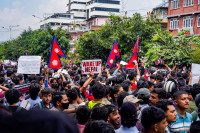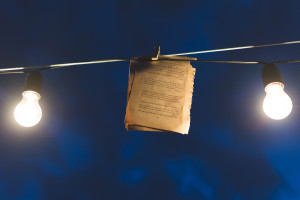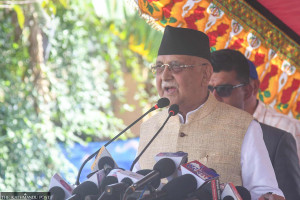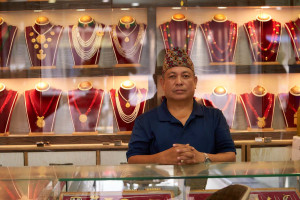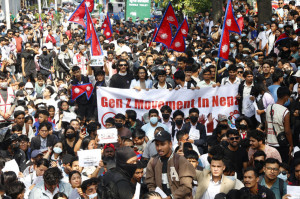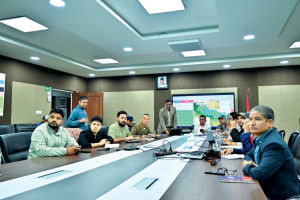Fiction Park
DISDAIN
I missed my mother terribly and wept silently under the blanket at night. But I got used to the place after a month, and soon I was busy with friends. After four months, she came for a visit
Nabina Adhikari
She called me yesterday, and told me over the phone that she had met the love of her life. She sounded excited and worried at the same time. For a moment, I could not believe it because imagining her as a bride with some unknown man was impossible.
All I said was, “Congratulations!” I knew that I did not sound happy, and I was sure that she did not expect me to say much. I had always been a silent kid. It was in my nature to observe things in such a manner that I weighed people within, inside a safe shell, so that there was no need for explaining what I thought of them. After a long pause, she asked me to come for the wedding.
“It would mean a lot to me.”
“I will think about it.”
My father died of snakebite when I was ten years old, while my mother was 27. The only thing he left behind for us was a hut that leaked everywhere. He had planned on going to Malaysia, and had a loan of two lakh rupees. His cousin threw us out of the hut after my father’s demise because he was sure we would not be able to pay him back. What could a widow with a ten-year-old with no skills to compete in the world do anyway?
I have only a few memories left of him, but I can remember he loved us dearly. We were a happy family despite our poverty. I vividly recall that he took us once to the cinema to watch Dilwale Dulhaniya Le Jayenge, where the lovelorn Shahrukh Khan tries to win over the heart of his love-interest’s father. My mother was so happy that her eyes glistened with a spark that I rarely saw. She whistled while I beamed with sunshine on my face. Later, we ate ice-cream and I asked my mother what would happen to the hero and heroine after the movie.
“They will get married and live happily ever after,” she said, while my father laughed.
“That’s just a movie. Wake up from your dreams,” he said.
We moved out of the village after we were made outcastes by society. A widow’s presence was a bad omen, the villagers said. We were denied water from the public tap and were stared at when we laughed at silly jokes. They expected us to live with sullen faces, so that they could pity us. After losing the last hope, which was the help she could get from her parents, my mother decided that we would go to the city.
“Where will we go? We have nobody in the city.”
“We need to escape out of here, honey, before they rip out the flesh and bones from our bodies. I will work there, and you will go to a school.”
“Is there plenty of food in the city?”
“Yes, there is.”
I did not see sadness in her eyes that moment. She had become a lioness who would do anything, and it was a woman in unbearable pain that I saw in her. I was frightened of her, because even with her tongue inside her mouth, she resembled Kali Ma, with her furious blood-red eyes. I imagined her cutting the heads of the villagers one by one, sewing them together and wearing it around her neck.
So we came to the big city. It took us a day and a horrible ride in a truck with 15 goats to finally reach here. It was chilly, and we were dressed in flip flops and worn-out cotton clothes. It was really dark, and we spent the night in the park, shivering, slightly feverish with hunger. We woke up the next morning to the sounds of people talking. A lady approached us and talked to us, and she took us to her home.
“I will pay you two thousand rupees per month, and you will have two meals a day, and you can stay here.”
She led us to a room that was stacked with clothes and newspapers, and I could hear water running.
“There must be a tap nearby.”
“Yeah, seems like that to me too.”
There was an underground tank below the room and an opening from where the pipe was connected. We could not sleep the whole night because swarms of mosquitoes buzzed in our ears, while we developed rashes from their bites.
My mother had to do everything from cooking and cleaning to washing the clothes and dishes. She barely had time to talk to me. I slept most of the time, out of boredom, and when I was awake, tried to help her. Months passed, but there was no hint of getting the salary. One day, when she asked the lady about it, she got furious and told her that there were two people to feed, and that she would incur losses if she gave us money. With the hope that my mother would find a better job, we left.
We walked from door to door. No one was willing to hire her. They asked us where we were from and looked at us with suspicion. After spending a week under an overhead bridge, we realised that we could not eat anymore because we were short of money, having spent whatever little we had.
One of the men who sold cheap Chinese sunglasses under the bridge advised my mother to admit me to an organisation where they offered poor children food, shelter and education. She thought it was too humiliating at first, but decided to have a look after he reminded her of our situation.
“Look, sister, you can’t always live like this, can you? She will have food, a roof over her and an education. She can get out once you are self-sufficient.
“Yes, you are right.”
The organisation was on the outskirts of the city, with a compound around it and a board that read, ‘Children of Heaven’. We met a middle-aged man with wise eyes, and he filled out some papers for me.
“Welcome home,” he said.
I missed my mother terribly and wept silently under the blanket at night. But I got used to the place after a month, and soon I was busy with friends, painting or learning to play the guitar.
After four months, she came for a visit. She wore heavy makeup and walked in high heels, as if she would topple onto the ground.
It made her look ugly, and her eyes were covered with thick kohl.
“It will take some more months before we live together. Are you going to be alright, sweetheart?”
“I like it here, mom.”
She handed me a bag with a summer dress, ballerinas and a blue shirt. I did not find the meeting emotional, and felt awkward the whole time she was there.
She did not visit me again for the next six months. I was happy where I was; I was getting straight A’s in each subject, and I had begun to perform with the guitar.
She looked like a doll on her second visit. She wore a knee-length dress, pink and glittery. Other kids laughed at her, but she did not seem to care.
“She is doing well and it would be better that she lived here,” she said.
The supervisor looked cross, as if she had tortured him with her presence.
She looked at me for a confirmation and my eyes met hers, with a plea that she leave me alone, because I was too ashamed that she was my mother.
I visited her every trimester. I got bored because she slept the whole day and left in the evenings for her work. She said that she worked in a hotel. It did not make sense to me because she did not wear a uniform, and nor did she look like she was going to work. She was all made up from head to toe.
Two days before I turned 16, I found out the mystery behind my mother’s silence. Her phone rang and I received it. One of her clients had called to let her know that they would be meeting at hotel Sunset. I was stunned. Furious with rage, I shouted at my mother, who had just come out of the bathroom.
“So you lied to me all these years. I know what you do for a living and I loathe you for your guts to abandon me so that you could have freedom to do whatever you liked.”
“I was helpless.”
She did not say anything further.
I left early morning the next day.
I haven’t seen her since then.
I did not respond to her calls until the last time when she said that it was urgent.
She said that she wanted to forget her dark past and start a family with me and her husband-to-be.
But I don’t care.
Directions:Read the Following Carefully!
01: Stories should be original, and must be balanced by i) Plot (beginning), ii) Narrative (middle), iii) Dialogues, and iv) Conclusion (proper ending)
02: Entries must carry at least 1,050 and not more than 1,500 words
03: Neat typing, correct spellings (UK English) and proper cases are essential in the texts
04: Submissions must include the writer’s full name, present status and complete postal/contact/email addresses
05: Entries must be sent to [email protected]




 26.12°C Kathmandu
26.12°C Kathmandu

